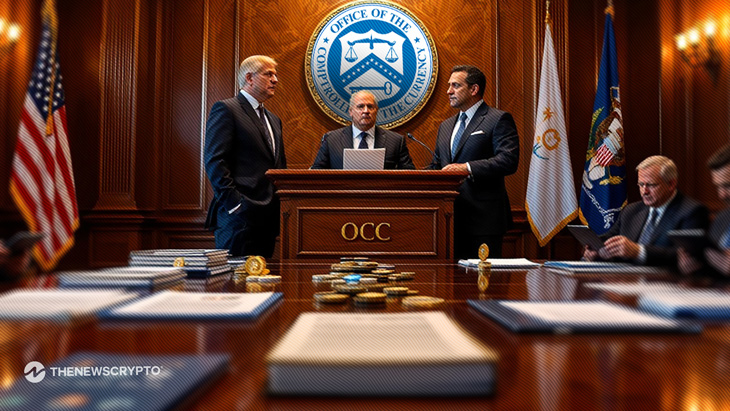OCC Allows U.S. Banks to Manage and Outsource Crypto Services

- U.S. banks can now manage crypto and outsource services.
- OCC guidance marks a reversal of past restrictions.
- More traditional banks may soon enter the crypto space.
In a major policy shift, the Office of the Comptroller of the Currency (OCC) has officially confirmed that national banks in the U.S. can buy, sell, and manage crypto assets under their custody. Even more significantly, they are now permitted to outsource crypto custody and execution services to third-party providers.
This new interpretive guidance, issued by Acting Comptroller of the Currency Rodney E. Hood, marks a regulatory turnaround. It follows coordinated moves by other U.S. agencies like the Federal Reserve and the FDIC, which recently rescinded earlier supervisory letters that required banks to gain prior approval for crypto-related activities.
Broader Shift in U.S. Crypto Regulation
This move effectively dismantles restrictions introduced in 2021–2022, when banks were required to obtain non-objection letters before handling cryptocurrencies. These past rules, viewed by many as part of the “Operation Choke Point” strategy against crypto, had slowed innovation and blocked many traditional institutions from entering the digital asset space.
The OCC’s new position revives the more open stance outlined in Interpretive Letter 1170 from 2020, which first allowed banks to provide cryptocurrency custody services. Now, with the latest update and Interpretive Letter 1183 from earlier this year, the OCC confirms that crypto custody, distributed ledger activity, and stablecoin operations are all permissible for national banks provided they follow sound risk management.
Traditional Banks Entering Crypto
This policy shift is likely to encourage more traditional banks to enter the crypto arena. Many institutions are interested in offering crypto services but lack the technical infrastructure. With permission to outsource custody and execution, they can partner with crypto-native firms to bridge this gap.
Critics, including Eric Trump, have labeled some anti-crypto banks as “slow and broken,” further highlighting the demand for innovation. With the OCC’s support, banks have the green light to modernize their services and meet evolving customer expectations.
Highlighted Crypto News Today:
Eric Trump Warns Banks to Embrace Crypto or Disappear Within a Decade
OCC Allows U.S. Banks to Manage and Outsource Crypto Services

- U.S. banks can now manage crypto and outsource services.
- OCC guidance marks a reversal of past restrictions.
- More traditional banks may soon enter the crypto space.
In a major policy shift, the Office of the Comptroller of the Currency (OCC) has officially confirmed that national banks in the U.S. can buy, sell, and manage crypto assets under their custody. Even more significantly, they are now permitted to outsource crypto custody and execution services to third-party providers.
This new interpretive guidance, issued by Acting Comptroller of the Currency Rodney E. Hood, marks a regulatory turnaround. It follows coordinated moves by other U.S. agencies like the Federal Reserve and the FDIC, which recently rescinded earlier supervisory letters that required banks to gain prior approval for crypto-related activities.
Broader Shift in U.S. Crypto Regulation
This move effectively dismantles restrictions introduced in 2021–2022, when banks were required to obtain non-objection letters before handling cryptocurrencies. These past rules, viewed by many as part of the “Operation Choke Point” strategy against crypto, had slowed innovation and blocked many traditional institutions from entering the digital asset space.
The OCC’s new position revives the more open stance outlined in Interpretive Letter 1170 from 2020, which first allowed banks to provide cryptocurrency custody services. Now, with the latest update and Interpretive Letter 1183 from earlier this year, the OCC confirms that crypto custody, distributed ledger activity, and stablecoin operations are all permissible for national banks provided they follow sound risk management.
Traditional Banks Entering Crypto
This policy shift is likely to encourage more traditional banks to enter the crypto arena. Many institutions are interested in offering crypto services but lack the technical infrastructure. With permission to outsource custody and execution, they can partner with crypto-native firms to bridge this gap.
Critics, including Eric Trump, have labeled some anti-crypto banks as “slow and broken,” further highlighting the demand for innovation. With the OCC’s support, banks have the green light to modernize their services and meet evolving customer expectations.
Highlighted Crypto News Today:
Eric Trump Warns Banks to Embrace Crypto or Disappear Within a Decade

